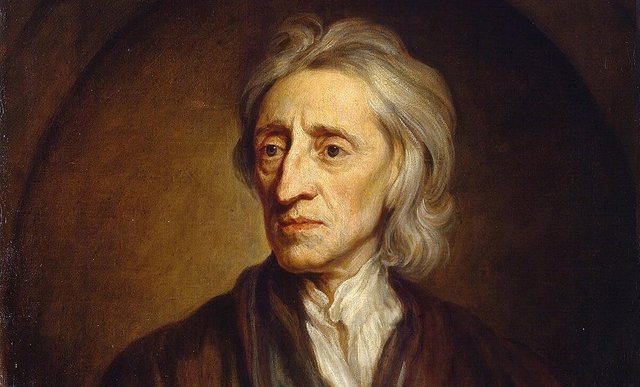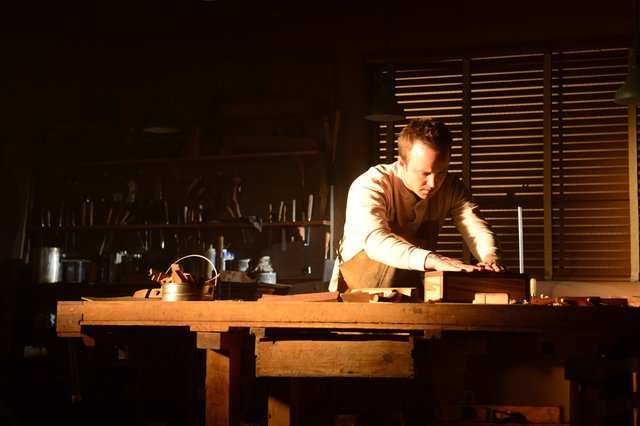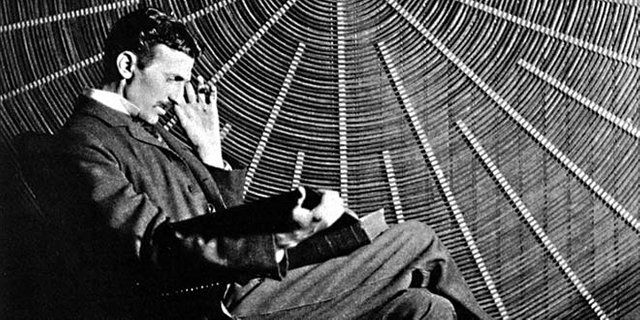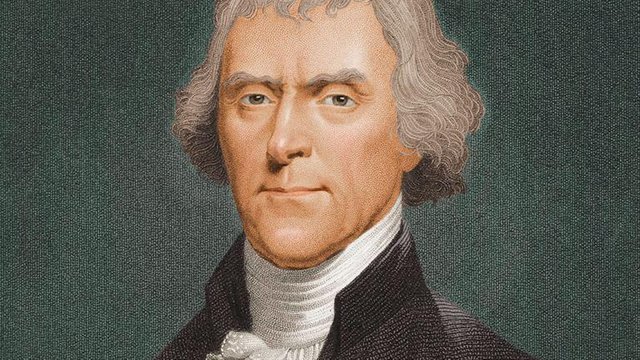
One thing that I like to do frequently, is to take up old readings that I did in the past and read fragments again, in order to appreciate with new eyes and with more experience those fundamental readings, acquiring in this way a new perspective on the matter. That was how last night I was reading again the Treatises of Civil Government by Locke, mainly the part where he expresses his philosophy regarding the justification of private property, but because I recently had a discussion about the legislation on intellectual property rights, it was impossible for me not to associate Locke's theory of private property, and to apply its logic as an argument in my favor, against intellectual property.
Most people who defend the free market necessarily support the concept of private property, understanding that it includes both consumer goods and the means of production, that is, anything else that any individual can possess, such as cars, food, clothing, land, housing, or industrial machinery, belongs to individuals who do not represent the State under any circumstances.
John Locke justifies it in the following way:
Though the Earth, and all inferior Creatures be common to all Men, yet every Man has a Property in his own Person. This no Body has any Right to but himself. The Labour of his Body, and the Work of his Hands, we may say, are properly his. Whatsoever then he removes out of the State that Nature hath provided, and left it in, he hath mixed his Labour with, and joyned to it something that is his own, and thereby makes it his Property. It being by him removed from the common state Nature placed it in, hath by this labour something annexed to it, that excludes the common right of other Men. For this Labour being the unquestionable Property of the Labourer, no man but he can have a right to what that is once joyned to, at least where there is enough, and as good left in common for others.
He that is nourished by the Acorns he pickt up under an Oak, or the Apples he gathered from the Trees in the Wood, has certainly appropriated them to himself. No Body can deny but the nourishment is his. I ask then, When did they begin to be his? When he digested? Or when he eat? Or when he boiled? Or when he brought them home? Or when he pickt them up? And 'tis plain, if the first gathering made them not his, nothing else could. That labour put a distinction between them and common. That added something to them more than Nature, the common Mother of all, had done; and so they became his private right. And will any one say he had no right to those Acorns or Apples he thus appropriated, because he had not the consent of all Mankind to make them his? Was it a Robbery thus to assume to himself what belonged to all in Common? If such a consent as that was necessary, Man had starved, notwithstanding the Plenty God had given him. We see in Commons, which remain so by Compact, that 'tis the taking any part of what is common, and removing it out of the state Nature leaves it in, which begins the Property; without which the Common is of no use. And the taking of this or that part, does not depend on the express consent of all the Commoners. Thus the Grass my Horse has bit; the Turfs my Servant has cut; and the Ore I have digg'd in any place where I have a right to them in common with others, become my Property, without the assignation or consent of any body. The labour that was mine, removing them out of that common state they were in, hath fixed my Property in them.
In this way, Locke tells us that everything a man takes from nature and alters from his natural state, is property of that man, because he has given the object a value, to which he is necessarily entitled, but to which the rest of society no. In this way, a carpenter has the right to own the chair, the table or anything else that he could design, regardless of whether the tree from which the wood was extracted, could belong to no one, or to society as a whole, because his work represents the result of having impregnated his personal skills to wood, that is, he has added a value.

Evidently, Locke establishes a theory that is not put into practice, but that nonetheless continues to be used as an argument to defend the prevailing private property system at present. It is assumed that who sells the wood to the carpenter, who has taken it from its natural state, and therefore, according to Locke, is the original owner of this material that nature has given the world, therefore, has the right to sell it to the carpenter, who will later give him the use that he considers best. All this seems very logical, it is natural to understand that we should all be the owners of what we produce with our minds and hands, however, Locke also explains that for this case, there are a couple exceptions. Which are?
1- Man can only appropriate that for which he has the capacity to own, in such a way that an individual cannot take over everything, because taking the same example as Locke, man could die of hunger, if to take apples or acorns needs the consent of this individual who is hypothetically the owner of everything, because the same problem would arise as in that case in which the consent of all the community members is needed to be able to use anything.
It will perhaps be objected to this, That if gathering the Acorns, or other Fruits of the Earth, &c. makes a right to them, then any one may ingross as much as he will. To which I Answer, Not so. The same Law of Nature, that does by this means give us Property, does also bound that Property too. God has given us all things richly, 1 Tim. vi. 17. is the Voice of Reason confirmed by Inspiration. But how far has he given it us? To enjoy. As much as any one can make use of to any advantage of life before it spoils; so much he may by his labour fix a Property in. Whatever is beyond this, is more than his share, and belongs to others.
2- The second exception is that there must always be enough natural assets so that property over something does not become the deprivation to others of those natural assets.
Nor was this appropriation of any parcel of Land, by improving it, any prejudice to any other Man, since there was still enough, and as good left; and more than the yet unprovided could use. So that in effect, there was never the less left for others because of his inclosure for himself. For he that leaves as much as another can make use of, does as good as take nothing at all. No Body could think himself injur'd by the drinking of another Man, though he took a good Draught, who had a whole River of the same Water left him to quench his thirst. And the Case of Land and Water, where there is enough of both, is perfectly the same.
As we know, natural resources are not unlimited, but on the contrary, for reasons of space, time, and nature, they are relatively scarce, because there is not enough for everyone, or is there enough? Taking into account the number of inhabitants that exist on the planet, and the amount of natural resources it has, it is clear that, for now, there are sufficient resources for all, however, if the growth rate continues to increase in the way that it has done it in the last decades, even applying an egalitarian policy, in which we all had access to resources, there would be less and less resources for each one of us, therefore, even though the current circumstances may still seem abundance, the reality is that we live in a limited world and with scarce resources, many of them not even renewable.
At present, although resources are scarce, there is no problem in granting property rights over virtually nothing, almost anyone can acquire almost anything. In fact, under the modern system of property, the exceptions established by Locke are not applied, because although it would be very difficult, it is anyway legally possible that an individual can obtain more than he can humanly and physically use, until reaching the point in which that person can have the monopoly of one or several resources that are considerably abundant.
So, why in the case of copyrights and patents, the rules apply almost in reverse?
We understand that the author's rights and patents grant to the owner of the patent, rights over the property of other people, that is, when someone invents or develops something new, and obtains a patent on that invention, he obtains, in turn, the right to deny that other individuals can use their property with complete freedom, in this case, the freedom to develop and commercialize what this individual has discovered, a freedom that the person who made the discovery counted on, but who will no longer have the rest of people.
All this in itself is quite arbitrary, that is, practically what they are telling us is that we cannot use the knowledge that others bring to society, which in my opinion, contradicts logic, reason, and the free market. When someone discovers something, does not necessarily mean that everyone has the ability to develop that knowledge, even if Disney loses the rights it has over Mickey Mouse, does not mean that we all have the ability to make a cartoon about this character, so, here we can understand that, what prevents something from being "copied" is not necessarily the fact that there is an intellectual right over that invention or discovery, since to copy that something that has been patented, in most cases, it is necessary to know design or create that something ourselves, which necessarily presupposes that we must acquire knowledge and ability to carry out that task. That is, the ability to copy something, in most cases, requires us to know how it is designed, and to have the ability to design it.
It is in this situation that there is a problem according to my personal appreciation, because it is difficult to understand, because property rights are applied in such a rigorous way when it comes to natural resources and limited material goods, when the opposite should be done, due to that are precisely scarce and not enough for everyone. Likewise, in the field of ideas and intellectual rights, where this same property policy is rigorously applied, however, doing so commits the same error, since ideas are unlimited, making conditions favorable for that the theory designed by Locke is implemented perfectly, but this is not the case, since it limits the right of people to perform a particular action with their property. Ideas are not by their nature scarce, however, by recognizing a right on an ideal object, scarcity is created where it did not exist before.
Natural scarcity is that which follows from the relationship between man and nature. Scarcity is natural when it is possible to conceive of it before any human, institutional, contractual arrangement. Artificial scarcity, on the other hand, is the outcome of such arrangements. Artificial scarcity can hardly serve as a justification for the legal framework that causes that scarcity. Such an argument would be completely circular. On the contrary, artificial scarcity itself needs a justification.
Bouckaert
The most frequent justification I usually hear in defense of intellectual property is generally about the protection of incentives for creative and innovative people, because according to the defenders of copyright, people would invent absolutely nothing, or innovation would be reduced, by eliminating the right that the innovator has, since it is what allows him to benefit economically through a legal protection that guarantees the monopoly on his innovation. This argument does not usually take into account, that the vast majority of people who have designed the greatest technological and scientific advances seldom enjoy any concrete economic benefit obtained through their creation or discovery.
Other supporters of intellectual property argue that certain ideas deserve protection because they are creations and not discoveries, however, the distinction between what is protectable and what is not protectable, is quite arbitrary. According to the legislation, philosophical, mathematical or scientific truths should not be protected, since commercial and social exchange would be hindered, in such a way that protection can only be obtained for the practical applications of ideas, but not for abstract ideas, or theoretical, in addition, this distinction between creation and discovery shows that the protection of intellectual property is not maintained because it is desired to favor innovation, but that it is carried out to maintain certain monopoly interests in the market.
Einstein's "discovery" of the relation E = mc2, once known by others, allows them to manipulate matter in a more efficient way. Without the efforts of Einstein, or the inventor, others would have continued to ignore certain causal laws, certain ways in which matter can be manipulated and used. Both the inventor and the theoretical scientist make a creative mental effort to produce useful new ideas. But one receives a reward and the other does not. In a recent case, the inventor of a new way of calculating a number that represents the shortest path between two points (an enormously useful technique) did not receive patent protection because this was considered to be "simply" a mathematical algorithm. But it is arbitrary and unfair to reward more practical inventors and artists, for example, engineers and composers, and to leave the theoretical scientists, mathematicians and philosophers without reward. The distinction is itself vague, arbitrary and unjust.

So, we can understand that the interests that lie behind the protection of patents are not those of rewarding and encouraging innovative people to carry out creations and discoveries.
This protection of intellectual property is not covered by the liberal philosophy of John Locke, because a patentable idea is abundant, due the idea itself is not exhausted and the use of it by other people does not generate scarcity in nobody, it necessarily means that anyone can appropriate it, which does not happen under the prevailing legislation system.
Under Locke's logic, if something is abundant enough, anyone could appropriate a part of that something, and if something is scarce, nobody in particular should do it, but at present it is totally the opposite, because regardless of If a resource is scarce, there will be private property in the same way, and in the case of ideas, which may be one of the few things that can be abundant enough, the opposite is done, since it prevents people can appropriate it. Things would be a little twisted according to Locke, right?
As Thomas Jefferson wrote: "He who receives an idea from me, receives instruction himself without lessening mine; as he who lights his taper at mine, receives light without darkening me."

Looking a little further, the intellectual property right and patents, end in the same way interfering with the free market, because in a free market, it is necessary that the production process is free, this means that companies can have the real possibility of offering homogeneous products in the market, which means that there is no difference between the product offered by a seller and the one offered by the rest of the sellers. In the free market, the production process is carried out by those who can do it in the most efficient way, regardless of whether that person is innovative or not, which is in conflict with the system of intellectual rights in force.
I believe that we currently live in a kind of pseudo-socialism, which is carried out in disguised form, because it is not possible to call the current economic system a free market, when the vast majority of the industry is controlled by large corporations, often multinationals, which are responsible for centralized production and are not really threatened by competition, because different legislations, including patents, protect their monopolies.
Did they sell us socialism as capitalism? Just read a bit about the theoretical classics of both ideologies to understand a little more what is our true reality.
In an economy where the free market prevails, it would be practically impossible for there to be companies with absolute powers that monopolize almost all the influence of one sector of the economy, a free market economy is necessarily composed of what we now call small and medium enterprises, never of this huge centralized companies that are formed and consolidated with the power of the State.
In this scenario, patents play a fundamental role, since competition in a free market is not about Coca-Cola competing with Pepsi, but that there should be competition between producers of both Coca-Cola and Pepsi, that is, all the production of goods and services cannot fall into the hands of a single producer, since that inherently destroys competition.
So, will it be time to rethink intellectual property rights, or am I just digressing?

Alcohol, fuel, lighters, candles, Tampax and Gillete products will trade well.
Downvoting a post can decrease pending rewards and make it less visible. Common reasons:
Submit
That's right, obviously there are exceptions, but in general terms, the legislation distorts the market a lot.
Downvoting a post can decrease pending rewards and make it less visible. Common reasons:
Submit
Interesting point of view, as a laws student this is something I've never thought of!
Downvoting a post can decrease pending rewards and make it less visible. Common reasons:
Submit
Yes, when I was studying Law, I read Lock for the first time, for Constitutional Law classes, now, I have done it again, but with another perspective.
Downvoting a post can decrease pending rewards and make it less visible. Common reasons:
Submit
Perfecto podremos tener un debate de esto algun dia, aun no he terminado la rebelion de atlas y hay otros libros que quiero ver primero como por ejemplo la maquinaria de la libertad de david freidman.
Downvoting a post can decrease pending rewards and make it less visible. Common reasons:
Submit
John got it on Locke NO glock
Downvoting a post can decrease pending rewards and make it less visible. Common reasons:
Submit